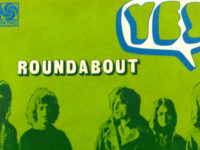For Billy Sherwood, the difficulty in accepting a childhood dream job with Yes in the 1990s was obvious. They already had, in Trevor Rabin and then the returning Steve Howe, an entrenched guitarist.
So where did he fit in? Principally, as a peacekeeper. Sherwood did whatever Yes needed, providing a Swiss Army knife of musical contributions, even as he worked to smooth the sometimes-difficult transition from Rabin (a member from 1982–94) back to Howe.
In all, Howe has three stints with Yes — between 1970–81, 1990–92 and again since 1995. He was protective of his own role in the band’s larger dynamic, and at first cast a critical eye on the Rabin-era hit music that had been a cornerstone of Yes’ setlist during that time away. But by 1999, Sherwood says they’d developed something of a truce.
“When we went in to write The Ladder, Steve and I worked together — well he’s going to play that, I’ll play this, the rhythm, the ‘Homeworld’ platoon with the 12-string arpeggios, it’s me playing that while he plays the leads,” Sherwood tells Vintage Rock‘s Shawn Perry. “We kind of came up with a way to make it work. At the time, I don’t know if Steve was so thrilled about it, but I think upon reflection he might have a different take on it now. We came up with good stuff and there were plenty of guitar parts to be covered because he does multiple layers in the studio.”
On stage, Sherwood ultimately ended up taking over much of the lead guitar work for material from the Rabin-led radio favorites 90125 and Big Generator — a decision, he says, borne out of necessity.
“It was a bit of a political dynamic going on at the time because the Rabin-era music Steve was not crazy about doing, and it had to be done,” Sherwood says. “We’re in a rehearsal working on material and ‘Owner Of A Lonely Heart’ comes up, and he flat out refuses to play it. Jon Anderson looks at me and says, ‘Then you play it.’ So I played it. Same went for ‘Hearts,’ ‘Rhythm Of Love,’ and all the other material we played. I would tell Steve and talk to him, musician to musician, ‘You should be involved with this and playing with the band when we play this material. Find your way in, find a cool part, enjoy the music and get into it. Let’s go.'”
Sherwood says Howe eventually came around. “Over a period of weeks, I coaxed him into playing on certain things that he flat out had refused before,” he adds. “So, I think it did work out. In hindsight, looking back on what that band was and how it played live despite all the politics, the quirky lineup because it had never been a six-piece like that. The band was sounding amazing. It was tight. It was kicking ass. So, for me, it was all positive.”
Sherwood sang and played bass, guitars and keyboards on 1991’s Union (which featured an updated version of a song he and Squire had worked on separately as part of Conspiracy), as well as 1997’s Open Your Eyes. He was then paired with Howe on guitar for The Ladder, which saw Igor Khoroshev take over keys. On the tour in support of 1994’s Talk, Sherwood played both keyboards and guitar. He was even showcased in a double-bass feature alongside Squire. “I don’t think anyone’s going to be doing that anytime soon,” Sherwood says.
- Ernesto Cervini’s Turboprop, “When I Fall” (2024): Video premiere - March 15, 2024
- Disaster Pony,“Dead Neon & The Noon Sun” from ‘Disaster Pony’ (2024): Video premiere - February 27, 2024
- Christopher Hoffman, “Farewell Forever” from ‘Vision Is The Identity’ (2024): Streaming premiere - February 19, 2024




